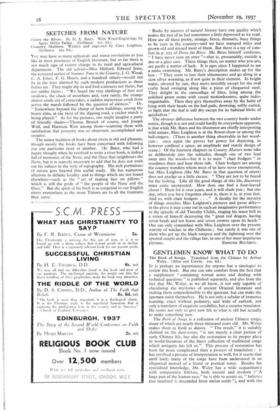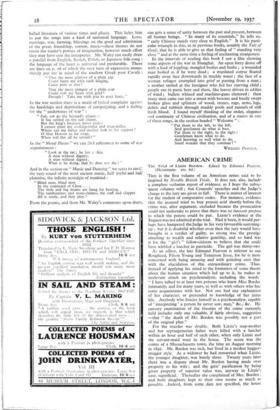GENTLEMEN KNOW WHAT TO DO
IT is perhaps an inpertinence for anyone but a sinologist to review this book. But one can take comfort from the fact that a supplement " containing textual notes and dealing with technical questions " is published separately, and also from the fact that Mr. Waley, as we all know, is not only capable of elucidating the mysteries of ancient Oriental literature and making them comprehensible to the ignorant, but can make the ignorant enjoy themselves. He is not only a scholar of immense learning, exact without pedantry, and wide of outlook, not only a translator of exquisite sensibility, but a creative translator. He seems not only to give new life to what is old but actually to make something new.
The Book of Songs is a collection of ancient Chinese songs, many of which are nearly three thousand years old. Mr. Waley makes them as fresh as daisies. " The result," it is suitably claimed on the dust-cover, " is not merely a clear picture of early Chinese life, but also the restoration to its proper place in world-literature of the finest collection of traditional songs which antiquity has left us." This process of restoration has been far more complicated than a process of translation : it has involved a process of interpretation as well, for it seems that until lately many of the songs have been understood in an allegorical instead of a literal or poetical sense. Besides his specialised knowledge, Mr. Waley has a wide acquaintance with comparative folklore, both ancient and modern (" A large part of the human race," he is able to assure us, " believes that mankind is descended from melon seeds "), and with the
ballad literature of various times and places. This helps him to put the songs into a kind of universal language. Love, marriage, war, farming, blessings on the good and admiration of the great, friendship, sorrow, music—these themes do not strain the reader's powers of imagination, however much effort they may have cost the interpreter. Mr. Waley can easily_ draw a parallel from English, Scotch, Polish, or Japanese folk-Song : the language of the heart is universal and perdurable. There are lines on p. 26 of which the very turn of expression imme- diately put me in mind of the modern Greek poet Cavafy :
" That the mere glimpse of a plain cap Could harry me with such longing, Cause pain so dire !
That the mere glimpse of a plain coat Could stab my heart with grief !
Enough ! Take me with you to your hom:.."
In the war section there is a strain of lyrical complaint against the hardships and deprivations of campaigning, and a feeling for the " undertones of war " : " Suk, suk go the bustard's plume:, ; It has settled on the oak clump.
But the king's business never ends ; I cannot plant my cooking-millet and wine-millet. Where can my father and mother look to for support 0 blue Heaven so far away, When will this all be sealed ? "
En the " Moral Pieces " we can rind referenccs to some of our acquaintances : " Look at the rat ; he has a :Ain.
A man without dignity, A man without dignity, What is he doing, that he does not die ? "
And in the section. on " Music and Dancing " we seem to care!: the very sound of the most ancient music, half joyful and half plaintive, the infinite nostalgia of mankind : " Blind men, blind men In the courtyard of Chou . .
The little and big drums are hung for beating, The tambourines and stone-chimes, the staff and clapper.
All is ready, and they play."
From the poems, and from Mr. Waley's comments upon them, one gets a sense of unity between the past and present,between all human beings. " In many of its essentials," he tells us. , "early Chinese stands very close to English." It is his parti- cular triumph in this, as in previous books, notably the Tale of Genji, that he is able to give us that feeling of " standing very close " and at the same time a feeling of enchanting strangeness
In the intervals of reading this book I saw a film showing some aspects of the war in Shanghai. An open lorry drove off with a load of joggling, mangled bodies and limbs ; a wounded man looked as if he were dead ; a mutilated corpse floated rapidly away face downwards in muddy water ; the face of a woman refugee crumpled into grief at parting from a man ; a mother smiled at the foreigner who fed her starving child ; people ran in panic here and there, like leaves driven in eddies of wind ; bullets whined and machine-guns clattered ; then many men came out into a street with brooms and busily swept broken glass and splinters of wood, stones, rags, arms, legs, debris and rubbish through muddy pools and runnels of still fresh blood. I found myself thinking of the order, elegance and continuity of Chinese civilisation, and of a stanza in one of these songs, in the section headed " Welcome " :
" Put them to the left, to the left, And gentlemen do what is best. Put them to the right, to the right ; Gentlemen know what to do. And knowing so well what to do, Small wonder that they continue I " WILLIAM PLomta.

















































































































 Previous page
Previous page